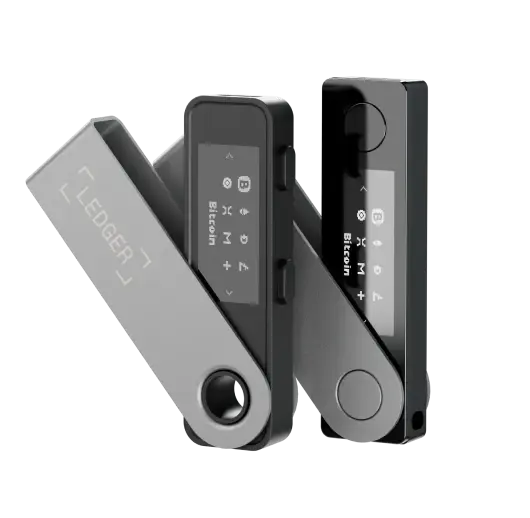Compare Ledger signers
Get a Ledger Nano
Select and purchase a Ledger hardware wallet of your choice.
- Beginner in the crypto world? Get started with Ledger Nano S Plus.
- Prefer a Bluetooth connection? Try with Ledger Nano X.
Looking for a Bitcoin Gold Wallet to buy and store your Bitcoin Gold? Join 7+ million customers who trust Ledger hardware wallets to securely store their crypto and use them on the day-to-day basis.
Trusted by over 8 million customers

Whether you’re looking to keep your crypto safe for long-term or manage them on a daily basis, Ledger has the right product for you.
Ledger hardware wallet
Ledger hardware wallet stores your private keys and signs transactions offline, making them resistant to malicious attacks and threats. Pair the Ledger crypto wallet with Ledger Live App to manage your Bitcoin Gold on the go.
Ledger Live App
Ledger Live App is a gateway to manage your assets, checking your real-time balance, tracking transaction histories, and more.

Select and purchase a Ledger hardware wallet of your choice.

Download and install the Ledger Live app in a couple of clicks on desktop and mobile.
Coupled with a Ledger, it makes the most secured wallet for your Bitcoin Gold.

Add a Bitcoin Gold account with a couple of clicks. Choose among different providers and easily manage your Bitcoin Gold.
And not only Bitcoin Gold. With Ledger Live, you can manage thousands of crypto and a large variety of NFTs.

The most premium secure touchscreen hardware wallet to protect and manage your Bitcoin Gold.

Designed with accessible sizing, enjoy the all new secure touchscreen user experience to manage your Bitcoin Gold.

Our classic entry-level hardware wallets built with all the essentials to secure your Bitcoin Gold.

With Ledger Live coupled with a Ledger, you can:
*Buy, send/receive, swap, stake, and other crypto transaction services are provided by third-parties provider, which availability may vary based on jurisdiction/territory.

Swapping allows you to explore different crypto assets, protect your Bitcoin Gold from volatility, and diversify your portfolio.
You can easily swap Bitcoin Gold through Ledger Live without using fiat currencies.

In 2017, Bitcoin Gold was established as a more user-friendly option to Bitcoin, aiming to combine the durability and security of the Bitcoin blockchain with greater flexibility for experimentation and development.
Unlike Bitcoin, BTG does not rely on Bitcoin hash power or compete for the “real Bitcoin” label, but instead seeks to expand the crypto space with a blockchain that remains closely compatible with Bitcoin while offering new opportunities for DeFi and DApp developers.
One of Bitcoin Gold’s main goals is to revolutionize the mining process on the Bitcoin blockchain by creating a more equitable system. By implementing changes to the Bitcoin blockchain through an alternate fork, BTG allows anyone to become a miner with basic hardware. This approach decentralizes mining and spreads it among a larger number of miners, instead of being controlled by a handful of large companies. To achieve this, Bitcoin Gold employs a PoW algorithm, Equihash-BTG, that cannot be run on specialized ASIC miners used for Bitcoin mining, giving ordinary users a fair chance to mine with common GPUs.
Find answers to some of the most common questions.
Related Resources